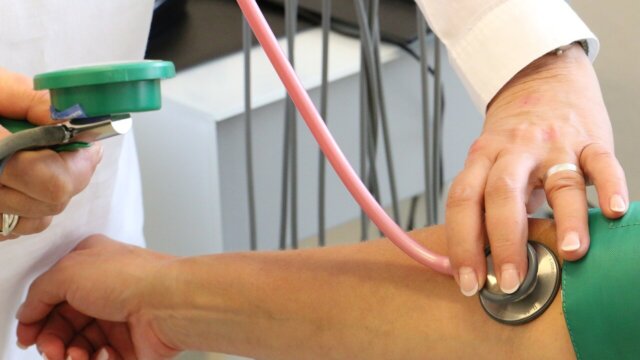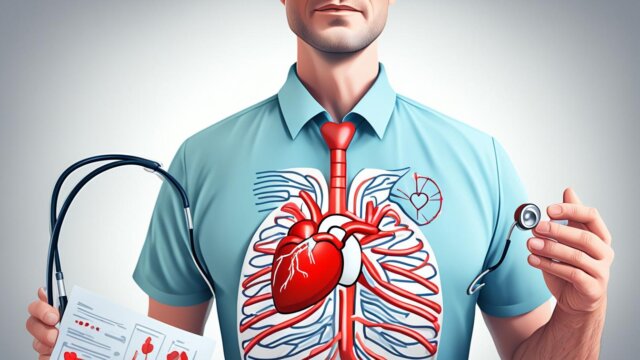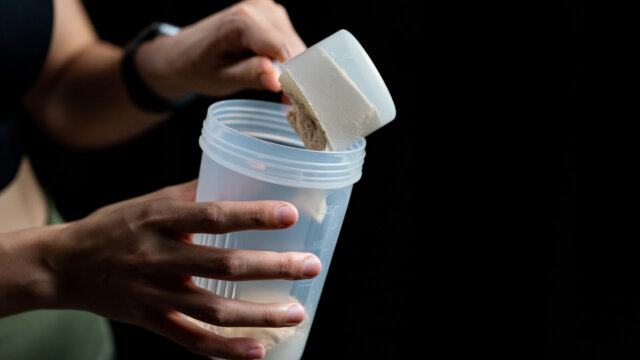FTC disclaimer: This post may contains affiliate links and we will be compensated if you click on a link and make a purchase.
Did you know only a few bacteria in our gut are studied for their probiotic effects? The health world is learning more about probiotics. Let’s explore how these good microbes can boost our health.
Probiotics are live bacteria and yeasts that help our digestive system. They are key to keeping our gut healthy. Adding probiotics to our diet can lead to better digestion, stronger immune system, and even happier minds.
Key Takeaways
- Probiotics are live microorganisms that provide numerous health benefits when consumed in adequate amounts.
- The two main groups of probiotics are Lactobacillus and Bifidobacterium, each containing multiple strains.
- Probiotics can alleviate symptoms of gastrointestinal disorders and potentially influence mood and behavior by modulating the gut-brain axis.
- Probiotic supplements should be sourced from reputable brands and provide specific strain information.
- Incorporating a diverse range of probiotic-rich foods and supplements can promote a thriving gut microbiome.
What are Probiotics?
Probiotics are live microorganisms, like bacteria and some yeasts. They help us when eaten in the right amounts. These good bacteria live in our gut and keep our microbiome balanced. Our bodies have trillions of microbes that help us in many ways.
Probiotics help boost these microbes for better health. You can take them as supplements or use them on your skin. They help fix an imbalance in our gut microbes. Each type of probiotic can affect us differently because of the microbes it has.
Remember, probiotics aren’t checked by the FDA. But, they’re often suggested after antibiotics or when we’re sick. They’re also good for those who often have gut problems.
A healthy gut means better immunity, less inflammation, and regular bowel movements. Good probiotics have helpful microbes, are safe, and make it through our digestion. Some top probiotics include Lactobacillus, Bifidobacterium, and the Acidophilus strain.
You can buy probiotics over the counter or eat them in foods like yogurt and sauerkraut. Make sure to look for “live and active cultures” on food labels.
Types of Probiotics
Not all probiotics are the same. They mainly come from two groups: Lactobacillus and Bifidobacterium. Each group has strains like Lactobacillus acidophilus and Bifidobacterium bifidum. These strains have different benefits for health.
Studies show some probiotics work well for certain health issues. For example, a 2018 study found Lactobacillus and Bifidobacterium strains help kids with skin problems. These strains were given to kids from 6 months to 9 years old.
This study also found that taking probiotics before and after birth helps kids a lot. But just taking them before or after didn’t help as much.
Also, the study showed some probiotics work better than others. Lactobacillus rhamnosus and Lactobacillus paracasei really helped with skin issues. But Lactobacillus reuteri and Lactobacillus acidophilus didn’t help as much.
Probiotics can also help with many other health issues. These include diarrhea, stomach problems, and even obesity.
Probiotic Strain | Potential Benefits |
|---|---|
Lactobacillus acidophilus | Supports immune system, aids in lactose breakdown |
Lactobacillus rhamnosus | Reduces risk of atopic dermatitis |
Lactobacillus paracasei | Reduces risk of atopic dermatitis |
Bifidobacterium bifidum | Supports immune system, limits harmful bacteria growth |
Bifidobacterium longum | Supports immune system, aids in lactose breakdown |
When picking probiotic supplements, look for ones with many live cultures and enough CFUs. Knowing about different probiotics can help you choose better ones for your health.
Benefits of Probiotics
Probiotics are live microorganisms found in fermented foods or supplements. They offer many health benefits. These include better digestion, a stronger immune system, and even mental health support. Studies show they can improve our overall wellness.
Digestive Health
Probiotics help keep the gut healthy. They keep the gut microbiome balanced, which is key for digestion and getting nutrients. They can ease symptoms of IBS, constipation, and diarrhea.
Probiotics cut C. difficile infection by 60%. Some strains can shorten diarrhea by 25 hours on average.
Immune Function
The gut microbiome helps control the immune system. Probiotics boost antibody production and improve immune cell activity. This may lower infection and autoimmune disease risks.
Mental Health
Probiotics might affect mood and behavior through the gut-brain axis. This is the link between the gut and the brain. Some studies show they help with anxiety and depression.
Chronic Diseases
Probiotics could help with chronic conditions. They might keep the heart healthy by lowering bad cholesterol and blood pressure. They could also ease allergies, eczema, and bowel disorders like ulcerative colitis and IBS.
Probiotic Lactobacillus crispatus cuts urinary tract infections in women by 50%.
Research on probiotics is ongoing. But, the current findings show they’re key for our health and wellness.
“Probiotics are live microorganisms that can be consumed through fermented foods or supplements.”
Incorporating Probiotics into Your Diet
Boosting your gut health is easy with probiotic-rich foods. Foods like yogurt, kefir, sauerkraut, kimchi, and miso are full of good bacteria. They help keep your gut healthy. These foods taste great and are good for you, helping with digestion and boosting your immune system.
There are more probiotic foods to try, like tempeh and kombucha. Pickles and buttermilk are also good choices.
- Add yogurt, kefir, and other fermented foods to your breakfast for a great start.
- Try different probiotic foods like sauerkraut, kimchi, and tempeh for variety.
- Kombucha is a tasty, vegan probiotic drink instead of coffee or alcohol.
When picking probiotic supplements, choose well-known brands with clear strain info and quality checks. Not all fermented foods have live cultures. Always check labels for added sugars and artificial stuff.
Probiotic-Rich Foods | Health Benefits |
|---|---|
Yogurt | Helps with bones, heart, and gut health, lowers diabetes and cancer risk, and aids in weight control. |
Kefir | Boosts bone, digestion, and fights infections. |
Sauerkraut | Full of probiotics, fiber, vitamins C and K, antioxidants, iron, and potassium. |
Kimchi | Good for digestive health, vitamins K, B2, and iron. |
Miso | Lowers blood pressure, cancer risk, and helps with cholesterol. |
Adding a mix of foods, supplements, and fermented foods to your diet supports gut health and overall wellness. There are many tasty and healthy options. It’s easy to make probiotics a part of your healthy life.
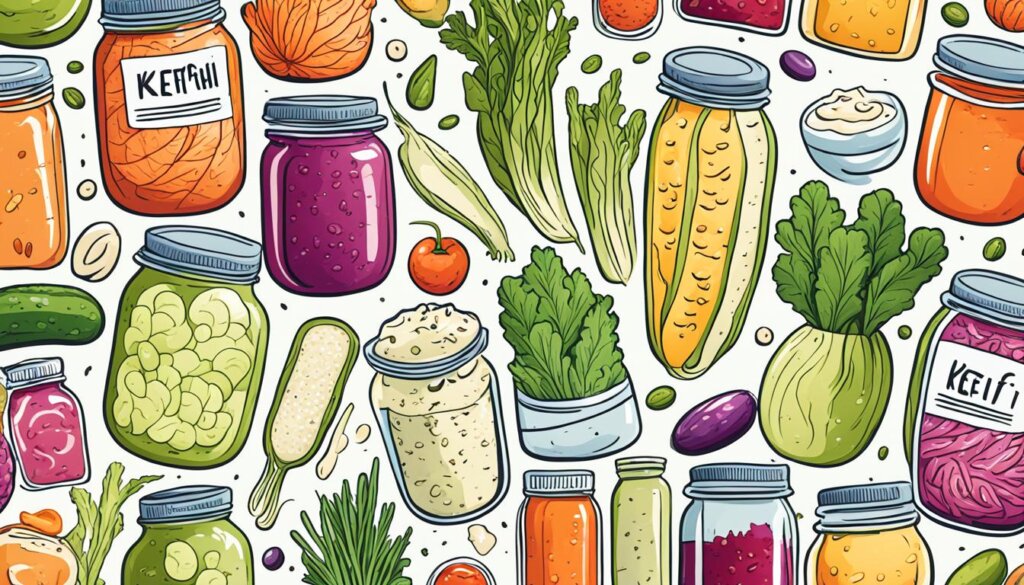
Tips for Maximizing Probiotic Benefits
Probiotics are live microorganisms that can provide many health benefits. To get the most out of your probiotics, follow these tips:
Embrace Probiotic Diversity
Different probiotic strains have unique benefits. To keep your gut healthy, eat a variety of foods and supplements rich in probiotics. Your body has trillions of bacteria, and your gut is home to hundreds of species. Eating a mix of probiotics helps your gut stay healthy and happy.
Fuel Your Gut with Prebiotics
Prebiotics feed the good bacteria in your gut, helping them grow and work better. Add foods like onions, bananas, and whole grains to your meals. These foods are good for your gut bacteria.
Practice Probiotic Moderation
Most people can safely take probiotics, but too much might upset your stomach. If you have small intestinal bacterial overgrowth (SIBO), probiotics could make things worse. Start with a little and slowly increase as needed.
Prioritize a Healthy Lifestyle
Probiotics work best with a healthy lifestyle. Eat well, exercise, sleep enough, and manage stress to help your gut bacteria. There’s a link between gut and brain health, which could help treat some brain disorders.
Follow these tips to make the most of probiotics. They help your gut microbiome and improve your overall health and well-being.
“A diverse and balanced gut microbiome is essential for maintaining optimal health.”
Gut Health and the Microbiome
The gut microbiome is full of tiny living things inside our intestines. It’s key to our health and well-being. It has about 100 trillion tiny creatures, with 500-1,000 types. These tiny friends help our immune system, mood, and fight off diseases.
When these tiny friends get out of balance, it’s called dysbiosis. This can happen from diet, stress, cleanliness, or antibiotics. Having a diverse gut is linked to better health and less risk of diseases. Each type of bacteria does something special for us.
Probiotics are good bacteria that can help with belly pain, bloating, and gas in people with IBS. Foods like chicory, whole grains, onions, garlic, asparagus, and bananas have prebiotics. These help good gut bacteria grow.

Our gut microbiome is a big part of our health. Knowing its value helps us keep it balanced and full of good bacteria. Eating foods with probiotics and prebiotics helps our good gut bacteria. This makes our microbiome healthier and stronger.
Signs of an Unhealthy Gut
If you often have digestive problems, notice weight changes, have trouble sleeping, get skin rashes, or can’t eat certain foods, your gut might be out of balance.
About 70 million Americans deal with digestive diseases every year. This includes issues like irritable bowel syndrome (IBS) and gastroesophageal reflux disease (GERD). A study found almost half of those with chronic fatigue also have IBS.
The gut does more than just digest food. It makes most of the body’s serotonin, which helps with mood and sleep. Skin problems like acne, eczema, and psoriasis might be linked to gut health. Research shows a connection between migraines and gut health, especially if you get nausea or vomiting with them.
An unhealthy gut might lead to autoimmune diseases like thyroid problems, rheumatoid arthritis, multiple sclerosis, and type 1 diabetes. People with frequent headaches often have gut issues too.
There are ways to help your gut. Eating foods with probiotics like yogurt, kefir, kombucha, and kimchi can boost healthy gut bacteria. Getting 7-8 hours of sleep a night can also help balance your gut. If you keep having gut problems, see a doctor to get help.
“Individuals who experience early life stress are more likely to develop IBS.”
Improving Gut Health Naturally
Keeping your gut healthy is key to feeling good overall. You can make your gut better with easy changes in what you eat and how you live. Eating foods full of probiotics and prebiotics, and changing your lifestyle, can help your gut microbiome. This means a happier, healthier gut.
Eating foods full of probiotics is important for gut health. Foods like yogurt, kefir, sauerkraut, and kimchi are great for adding good bacteria to your gut. Foods like garlic, onions, bananas, and whole grains feed the good bacteria, helping them grow and work better.
Changing how you live is also key to a healthy gut. Less stress, enough sleep, and drinking water can help your gut. Chewing your food well and eating slowly can also make digestion better and ease discomfort.
If you have an upset stomach, weight changes, trouble sleeping, or food issues, your gut might be out of balance. Fixing these problems naturally can help your digestive system get back to normal. This can make you feel better overall.
Gut health is a journey that includes eating foods full of probiotics and prebiotics, and living a healthy life. Using these natural ways to heal your gut can really help. Start these gut-healing steps and enjoy a healthy microbiome.

“Healthy gut, healthy you. Nurture your microbiome with nature’s bounty.”
Probiotics
Adding probiotic supplements to your diet can boost your gut health and overall health. Probiotics are live, good bacteria that help balance your gut microbiome.
There are many types of probiotics, like Lactobacillus and Bifidobacterium. Each type has its own health benefits. These good bacteria can help your immune system, fight obesity, and ease depression and anxiety.
Prebiotics are fibers that feed probiotics, helping them grow and work better in your gut. Eating both prebiotics and probiotics can keep your gut microbiome healthy.
When picking a probiotic supplement, choose one with many strains and live cultures that make it through your digestive system. Talk to your doctor to find the best probiotic for you and your gut health goals.
“A healthy gut microbiome is essential for overall well-being, impacting everything from immune function to mental health.”
Eating foods high in probiotics, such as yogurt, kefir, sauerkraut, and kombucha, can help your gut health. Adding foods high in prebiotics, like bananas, garlic, and onions, can help good gut bacteria grow.
For a healthy gut microbiome, eat a varied, fiber-rich diet, exercise, and get enough sleep. Taking care of your gut health can improve your overall well-being.
Gut-Friendly Foods
Some foods help grow good bacteria in the gut, making us healthier. These foods are high in fiber, garlic, fermented foods, and collagen-boosting foods.
High-Fiber Foods
Legumes, whole grains, veggies, and fruits are full of fiber. Fiber feeds probiotics. Eating these foods helps the gut and keeps digestion healthy.
Garlic
Garlic can make the gut healthier by helping more good bacteria grow. Adding garlic to meals is easy and supports gut health.
Fermented Foods
Foods like yogurt, kefir, sauerkraut, and kimchi have probiotics. These foods help balance the gut.
Yogurt is full of probiotics. Kefir has many good bacteria and yeast. Tempeh boosts good bacteria and is made from soybeans.
Kimchi has lots of good bacteria and is made from fermented cabbage. Kombucha is fermented tea that’s good for the gut. Miso is a fermented soy paste with good bacteria.
Natto is a Japanese dish from fermented soybeans, great for the gut. Sauerkraut is fermented cabbage, easy to make at home. Some cheeses and green olives are also good for the gut. Apple cider vinegar has good bacteria and is easy to find. Sourdough is nutritious and easy to digest.
Collagen-Boosting Foods
Bone broth and salmon skin are good for the gut microbiome. Eating these foods helps keep the gut healthy.
Adding these foods to your diet helps grow good bacteria. This improves digestion and overall health.
“A healthy microbiome can contribute to managing depression.”
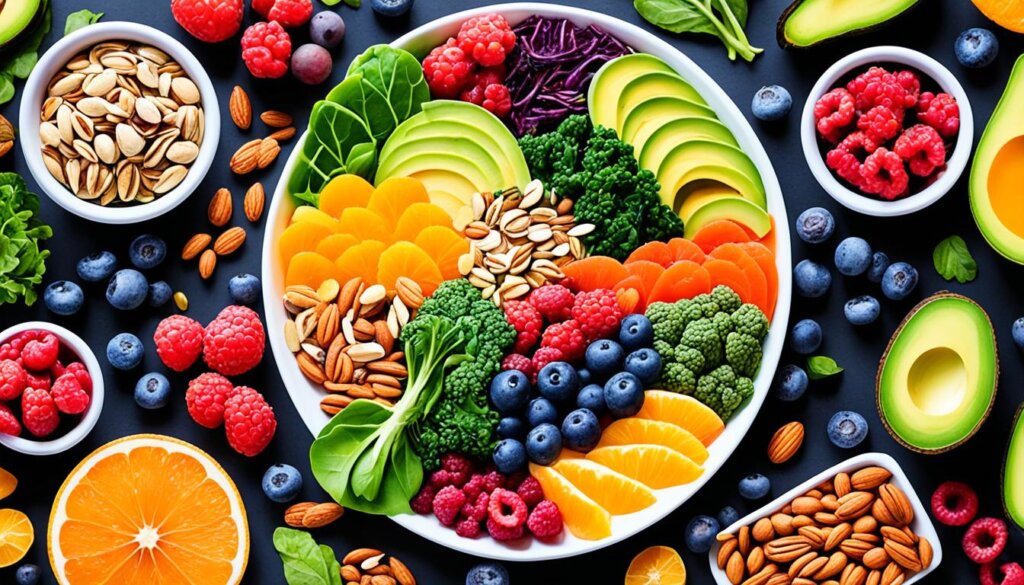
What we eat changes our gut bacteria. Changing to a plant-based diet can change the gut in a day. Eating more gut-friendly foods helps good bacteria grow and brings health benefits.
The Role of Diet and Lifestyle
Your diet and lifestyle choices are key to a healthy gut microbiome. Stress, sleep, and eating lots of processed and sugary foods can hurt your gut health. Studies show that stress and bad sleep can mess up your gut’s balance. Eating too much processed and sugary food can also lower the good bacteria and diversity in your gut.
But, you can make changes to help your gut. Eating a balanced diet full of fiber, probiotics, and prebiotics can help good bacteria grow. This is good for your health.
Gut-Friendly Lifestyle
Keeping a healthy gut means managing stress and getting enough sleep. Too much stress can mess up the gut-brain link, leading to an unbalanced gut. Bad sleep can also change your gut microbiome, affecting your health.
Along with managing stress and sleeping well, eating gut-friendly foods helps too. These include foods high in fiber, fermented foods, and those with lots of prebiotics and probiotics.
Gut-Friendly Foods | Benefits |
|---|---|
High-fiber foods (e.g., fruits, vegetables, whole grains) | Promote the growth of beneficial gut bacteria, improve digestion, and reduce inflammation. |
Fermented foods (e.g., yogurt, kefir, sauerkraut, kimchi) | Provide a source of probiotics, which help restore balance in the gut microbiome. |
Prebiotic-rich foods (e.g., onions, garlic, bananas, whole grains) | Serve as food for the beneficial bacteria in the gut, supporting their growth and diversity. |
By changing your lifestyle and eating a balanced diet with gut-friendly foods, you can keep your gut microbiome healthy. This leads to better overall health.
Conclusion
Probiotics are a key part of keeping your gut and overall health strong. They help by balancing the good bacteria in your body. By adding probiotics to your diet and living a healthy life, you can boost your digestion, immune system, and even your mood.
Studies show that probiotics can help with many health issues like high blood pressure, high cholesterol, cancer, and stomach problems. They are also used in foods like dairy, drinks, and baked goods for their health benefits. To get the most benefits, aim for about 109 CFU of probiotics each day.
Having a healthy mix of gut bacteria is key to feeling your best. By choosing wisely with probiotics, focusing on gut health, and living a healthy life, you can improve your health. This leads to a better digestive system and overall well-being.
FAQ
What are probiotics?
Probiotics are live microorganisms. They include bacteria and some yeasts. These help us when eaten in the right amounts. They live in our gut and keep it balanced.
What are the most common types of probiotics?
The top probiotics are Lactobacillus and Bifidobacterium. Within these, there are many strains. For example, Lactobacillus acidophilus and Bifidobacterium bifidum are common ones.
What are the potential benefits of probiotics?
Probiotics can boost our health in many ways. They help with digestion, boost the immune system, and even our mood. They can also help manage chronic diseases.
How can I incorporate probiotics into my diet?
You can get more probiotics from food and supplements. Foods like yogurt and sauerkraut are full of them.
What tips can I follow to maximize the benefits of probiotics?
Pick different types of probiotics and eat foods that help them grow. Also, eat in moderation and live healthily to help good gut bacteria thrive.
What is the gut microbiome, and why is it important?
The gut microbiome is the bacteria in our intestines. A diverse one is linked to better health and less risk of diseases.
What are the signs of an unhealthy gut?
Signs include upset stomach, weight changes, trouble sleeping, skin problems, autoimmune diseases, and food intolerances. These could mean your gut microbiome is out of balance.
How can I improve my gut health naturally?
Eat foods rich in probiotics and prebiotics. Also, make healthy lifestyle changes like managing stress and sleeping well.
How can probiotics and prebiotics help improve gut health?
Adding prebiotics or probiotics to your diet can boost gut health. Probiotics are live good bacteria that help balance your gut. Prebiotics feed these bacteria, helping them grow and work better.
What are some gut-friendly foods?
Foods like high-fiber foods, garlic, and fermented foods help good bacteria in the gut. They make us healthier overall.
How do diet and lifestyle impact gut health?
Eating too much processed or sugary food and being stressed can hurt gut health. Eating well and making healthy lifestyle changes can help keep your gut healthy.



